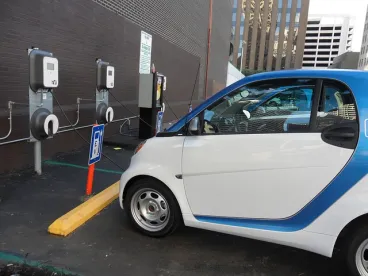Yesterday, Porsche debuted its first electric vehicle, Taycan. With a 670 horsepower engine, the Taycan Turbon model can accelerate from 0 to 60 mph in less than 3 seconds. On its test run on the 12.8 mile Nürburgring track, the car tracked at a lap time of 7:42, only a tad slower than other high-end internal combustion engine sports cars.
With the Taycan, Porsche will be joining the ranks of other traditional automobile makers that have recently entered the electric vehicle market. Among luxury brands, BMW was the first to enter in 2013 with the i3 model. Mercedes and Audi joined the field within a few years after with the B-Class and e-tron models, respectively.
This steady stream of traditional car manufacturers entering the electric vehicle space has been made possible with recent innovations in battery technology. Historically, the utility of electric vehicles was severely constrained by their batteries, resulting in limited driving range, low battery capacity, long charging time, and high costs. But advances in lithium-ion batteries have enabled such batteries to be produced at much lower costs with faster charge times and much higher energy capacity to allow vehicles to travel much further ranges, as illustrated in the following table.
|
Model |
Battery Capacity |
Range |
0-60 mph |
|
Porsche Taycon |
93.4 kWh |
250 mi |
3 sec |
|
Tesla Model S |
100 kWh |
370 mi |
3 sec |
|
Audi e-tron |
95 kWh |
204 mi |
6.6 sec |
|
BMW i3 |
42.2 kWh |
126 mi |
8 sec |
|
Jaguar I-Pace |
90 kWh |
234 mi |
4.8 sec |
|
Mercedes-Benz EQC |
80 kWh |
293 mi |
4.9 sec |
Source: TechCrunch
Another factor driving the development of electric vehicles may be regulatory pressure. Certain countries, such as the United Kingdom, France, and Norway, have announced that they will attempt to eliminate petroleum and diesel-based automobiles within the next two decades. Some municipalities have already banned or limited internal combustion engine cars from at least some parts of its boundaries. For example, Madrid has restricted old gas cars from its city center since December of last year.
With the increase in affordability and performance of electric cars, customer perceptions have also drastically improved, and higher demand for such vehicles is predicted for the future. Although there are a few holdouts for the moment, we can expect more established automobile manufacturers to join the electric vehicle field. Volvo, for example, is expected to release its first all-electric vehicle next year in 2020.




 />i
/>i

